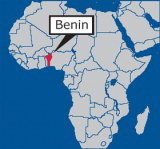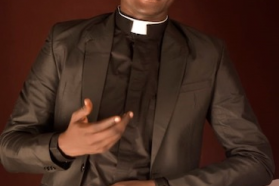Notes on Benin

Benin
On the eve of the Holy Father's visit to Benin, which takes place from 18-20 November, Fides has sent us this brief feature about the country. During his trip - which will be his 22nd apostolic journey, Pope Benedict will attend the signing and publication of the Post Synodal Apostolic Exhortation of the Second Special Assembly for Africa of the Synod of Bishops.
Benin is a country in West Africa which was known as Dahomey until 1975. The country covers an area of 112,620 sq.km. and a population of 9.3 million inhabitants (updated to 2009, World Bank sources). The political capital of Benin is Porto Novo, but the commercial capital is Cotonou. The Republic of Benin borders to the north by Burkina Faso and Niger, to the east by Nigeria, on the west by Togo, and south by the Gulf of Guinea.
A former French colony, it has been independent since 1 August 1960, with the name the Republic of Dahomey. In 1972 a coup led by Mathieu Krakou, brought to power a military junta. The country was renamed the People's Republic of Benin in 1975 and then the Republic of Benin in 1990. In December of that year a new Constitution was approved that officially ended the 17 years of Marxist military rule. President Karakou, under pressure from internal democratic groups and international financial institutions, in February 1990 took part in a national conference (called the 'Conference of the living forces of the nation'), the first of its kind in Africa, which had brought the country to
democracy.
In 1991 Karakou was defeated in the presidential election by Nicaphore Soglo, who returned to power in elections held in 1996. In 2001, Karakou won the presidential election, after other candidates withdrew. In 2006, Boni Yayi was elected Head of State on the ballot. Both Karakou (at the time was 72 years old) and the former President Soglo did not present themselves because they had reached the age limit established by the Constitution.
Regarding the economy, 60% of the population is employed in agriculture. The main crops are cassava, beans, sweet potatoes, sorghum, maize, millet, rice and in particular cotton, which is the main source of foreign currency in the country and provides livelihood for two million people.
In Benin, some 40 ethnic groups live together, the largest of which is the Fon, which identifies 50% of the population. Other smaller groups are the Yoruba, the Somba, the Beriba. Each of them has its own dialect. The official language is French, spoken primarily in the cities.
Catholic Church
In Benin, there are 10 dioceses, 338 parishes and 801 pastoral centers, with 11 bishops, 811 priests, 1,386 men and women religious, 30 lay members of secular Institutes and 11,251 catechists. The minor seminarians are 308 and the major seminarians are 497.
A total of 57,771 students attend 234 Catholic education centres, from kindergartens to universities. Among other institutions belonging to the Church or run by priests or religious in Benin, are 12 hospitals, 64 clinics, three leper centers, seven homes for the elderly or disabled, 41 orphanages and nurseries, three family counseling centres and three other institutions.
Source: Fides
For more information on the history, religions, the Catholic Church's presence in Benin see: www.fides.org/aree/news/newsdet.php?idnews=13709&lan=ita


















